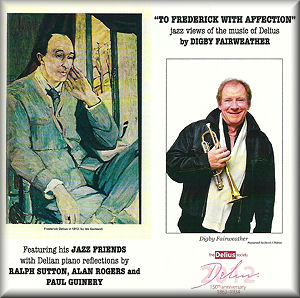To Frederick With Affection
1. Brigg Fair
2. Summer Evening
3. Fennimore and Gerda
4. Ol' Man River
5. On Hearing the First Cuckoo in Spring
6. Octoroon
7. Sleigh Ride/Daybreak Dance
8. Florida Flare Up
Frederick and Friends
9. In the Dark
10. Dance for Harpsichord
11. Candlelights
12. Rialto Riplples
13. In a Mist
14. To a Wild Rose
15. Flashes
16. In the Dark
I must first declare an interest. I am a member of the Delius Society, primarily because I think Delius is one of the most unjustly neglected composers - although his 150th anniversary celebrations in 2012 saw many more performances of his works than is usually the case. The Delius Society commissioned this disc from Digby Fairweather, who gave a talk about it at a recent symposium on Delius. Digby Fairweather is a respected jazz musician and I had high hopes that this album would bring me new insights into the composer.
The album is sub-titled "Jazz views of the music of Delius" and it comes in two parts. First of all, Fairweather's band plays a suite by Digby of jazzed-up versions mainly of works by Delius, although Harry Warren's Octoroon seems out of place here. The second part consists of performances by various pianists (plus one jazz group) of works which Fairweather believes reflect Delius' style.
One major problem with the jazzed-up pieces (tracks 1 to 8) is that the jazz versions seem a long way away from Delius' originals. A typical example is Summer Evening, which Digby's group turns into a swing tune that lacks most of the harmonic subtleties of the original composition. It could hardly be otherwise, since Digby's sextet cannot have the resources of a symphony orchestra. The result is that Delius' main theme is played and then improvised upon in isolation, giving only a very partial impression of the piece.
The melody of Brigg Fair is stated by the guitar and the clarinet - the latter with some dubious intonation. Then the theme is the subject of extemporization by each of the front-line instruments. The track ends after interpolating Big Noise from Winnetka! Fennimore and Gerda takes the theme of the Intermezzo from Delius' opera Fennimore and Gerda (with some suspect intonation from the ensemble) but doesn't give it much time to develop
Jerome Kern's Ol' Man River is included (according to Digby's sleeve-notes) because Ken Russell's film about Delius showed the composer asking his wife to put on a record of the tune as sung by the Revelers. Fairweather suggests "Perhaps he had a friendly ear for jazz rhythm too". Aye, there's that "perhaps". It is well known that Delius liked the song but to extrapolate from this that he liked jazz rhythm might be debatable.
On Hearing the First Cuckoo in Spring is played fairly straight by Julian Marc Stringle and Dominic Ashworth, although Julian's intonation problems crop up again when he improvises on the theme. Octoroon was not composed by Delius but by Harry Warren. Digby says he included it because of its reemblance to some devices used by Delius, and he throws in musical references to the James Bond theme and Artie Shaw's Nightmare. After a Dixieland medley of Sleigh Ride and Daybreak - Dance, the first part of the album ends with Florida Flare Up, part of the Florida Suite turned into a Mardi Gras celebration.
The jazz interpretations tend to conceal rather than reveal much about the Delian compositions they are based on. There is not much more to learn about Delius from these performances than can be revealed by turning an impromptu by Chopin into the popular song I'm Always Chasing Rainbows, or Tommy Dorsey using a piece by Rimsky-Korsakov as the basis for Song of India.
Would Delius have approved of such examples of jazzing his classics? Digby Fairweather tends to undermine himself by quoting Delus: "There seems to be a very prevalent belief that any Tom, Dick or Harry has the right to tamper with a work of art, even to the extent of altering it beyond recogniton, and forcing it to serve a purpose its composer never dreamed of!"
The second part of this album consists of pianists (plus one jazz group) performing works which Digby believes have parallels with Delius' work. Five of the eight pieces are by Leon "Bix" Beiderbecke, including two interpretations of Bix's In the Dark. There may be some resemblaces here but I find it hard to discover anything Delian about Rialto Ripples.
Fairweather's sleeve-notes spell out some of the similarities between pieces on the album and Delius' compositions, but I think Digby is exaggerating when he makes such propositions as "It could be argued that Delius was (in certain measured respects) the direct musical forerunner of George Gershwin, Duke Ellington or Gil Evans". And it is certainly going too far for Digby to suggest that "the accidental relationships between Delius and [Johnny] Mercer are uncanny" - for such tenuous reasons as that both men were inspired by Black American folk-music. After all, numerous composers and musicians were equally inspired.
I hope that this album may introduce some new listeners to the music of Delius, even though fewer than half the tracks are based on his compositions. As an enthusiastic Delian, I was looking forward to this CD but I'm sorry to say that, although thought-provoking, it is a disappointment.
Tony Augarde
www.augardebooks.co.uk
